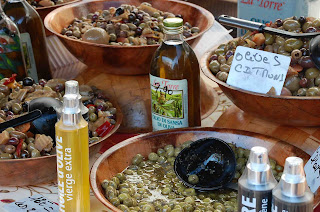Cutting a Deal or Creating Social Bonds? It's your Choice
As a rule of thumb, and luxury goods aside, I think I can safely say that people generally like to get a deal when it comes to buying things. Clothes on sale for 30% off? Sure! A two-for-one special on a pint of strawberries? Send them my way! However, I find that our impulse and desire to save some cash comes with a certain insightful ethic, which is particularly brought to light when it comes to buying food from a person rather than from a corporation/big grocery chain.

We are social animals, and therefore generally like to strengthen the bonds we have with our fellow Man. I also like to think that we are all generally good people seeking to help each other out rather than screw each other over. There is something both charming but also very rewarding about shopping at a farmers market, through a CSA, or at a co-op or some place that let's us know where our food comes from. One such place is one where we can talk to the person who cultivate Nature's bounty, where we can go have a good conversation with other market shoppers or farmers about anything from how they cook a particular local veggie to the situation in Pakistan. It's a social setting, it's a friendly setting, and our primary goal often becomes making friends as much as it has to do with buying our groceries for the week.

On the flip side, there is something more cold and distant about the grocery store experience. Plenty of writers have described it better than me. Some people might still like it, sure, but what is so impersonal about those aisles of dead food, the buzz of the halogen lamps, and the bleary-eyed cashier scanning your "food" with usually little more conversation than a hello or perhaps a clever repartee of no more than 10 words on a good day. In a big grocery store, we aren't buying from John down the road, or Jane whose kid just got into college, we are buying from corporation X who buys mass amounts of produce from farmers Y and Z, who gets workers P and M to haul the produce onto the shelves every morning with little pride or care. Most of these people's faces we may never see, except perhaps via a CEO statement about a recent company merger, about their company going public, or something "newsworthy" in modern society's sense.
What am I getting at exactly? Well, here's a story:
A number of local farmers from my area in the South of France had the brilliant idea to pool their resources together and build a co-op building where they could all come sell their produce every day. It's entirely stocked and run by local farmers. At the end of each day, they all get their dues based on the day's sales on their particular goods. There's everything from local jams, artisan bread, fresh goat cheese, fruits and veggies, to local fish and duck there. It's a great concept. Rather than have to fight your way through the growing number of farmers markets that accept resellers (you know, the guys who show up selling produce from halfway across the country and sometimes even the world), you can just go there, know exactly who grew or raised your food and voila! It also gives these farmers a common space to work and sell their food, probably saving lots in air pollution by avoiding having every customer drive out to their individual farms to pick up individual food groups. On top of that, most of the farmers are either certified organic or pesticide-free. Everybody wins, including Mother Nature herself.

My parents and I went there to pick up some produce a few days ago, and we bought quite a bit of food. One of these food items was a €10 piece of duck for the two of them. However, on our way home, we realized they had forgotten to charge us for the duck at the common check-out. Now, at a Safeway, Walmart, hell, even at a Whole Foods, I think most people's reaction would have been a fist pump. Don't deny it, it's almost a proven fact. I've been that person, as have many other people who shall remain nameless who got a "free" bag of unscanned candy, a couple apples, or even a sack of very expensive walnuts scanned as a cheaper bulk item by mistake from your grocery store. I know you're out there, I've talk to you, I've read your blogs, you're out there, sometimes, I am you. However, in the context of this co-op, at a farmers market, and anywhere else where you are dealing with a human being, a small business whose ethics you stand for, and not a profit-driven company, our reaction is quite the opposite. In this case, my mother's immediate impulse was to say "We have to go back! We can't just take the farmers' money!"

Of course, we didn't just turn around and drive all the way back there (think of the gas!), but we did go back yesterday when we were picking up a few more things, explained the mistake and paid off the nice duck lady who didn't get her €10 the day before. Now we all know that farmers work really hard to make a living, so they are often the last people you want to screw over. And while this experience was definitely the event that shifted world gravity or change my life philosophy, it was indicative of something deeper. We are people, who desire to find a connection with others, live off the land we live on, and support the common good. When we deal with people, we act to increase everyone's welfare, not just our own. We lose sight of our humanity when we shop at faceless stores and chains, but we regain it when we make contact with those who make our food and produce our goods. This should be our world. These people and these types of ethics should populate it. But unfortunately, this is increasingly not so.

Isn't it obvious that we have a flawed system, in that it is dominated with corporations and multinationals increasingly stocked with self-checkouts and automated scanners rather than by small businesses staffed by actual people trying to do good? Whenever such an event like these happen, we find it pleasurable to have "screwed over" the corporation and saved a couple bucks but find it terrible to think that we forgot to pay our farmer at the market.
In conclusion, I want you to rethink your shopping habits if you haven't already. You will be happier to shop from people rather than from buildings, you will be more fulfilled to shop with people rather than with machines. Real farmers will be happier. The environment will happier. And 99% of the time, your tummy and your conscience will be happier too.
(P.S. The pictures of the produce above are the glorious amount of fresh, local, pesticide-free food you can get for under €20, about 30 $US, at such a place. Further proof, that a) eating an all organic fruits and veggies is NOT more expensive than a standard diet and b) that shopping at farmers markets and co-ops is NOT more expensive than shopping at big-named grocery stores. So there.)



Ideally yes that is exactly how I want to shop. If I could avoid the supermarket I would, 90% of what they sell I don't want . However we have no co-op and the farmers market as it were is supplied by one company that has things shipped from all over.
ReplyDeleteI did luck out and recently a produce market opened that does supply some local grown organic produce but not enough.
Recently my husband got a new co-worker who just happens to be a small farmer. He grows hydroponically. He gifted us with some spinach. When my squash comes in this fall I will gift him. I hoping we can work some kind of exchange deal on a regular basis.
I hope that by supporting what resources I do have , they will be able to expand.Unfortunately modern economics have really messed up a persons connection with there food and the people who grow it.
Thanks for your story :) I always love to hear how other people have to adapt to the environment they live in, and you've done the very best you can! And I think gifting fresh produce is one of the most wonderful feelings (both to give and receive actually...), I love doing that!
ReplyDeleteAlso on the upside, I obviously totally agree with you that we have lost a connection to our food but I believe that it's slowly but surely growing again. Your story and consciousness as well as those of so many others are prime examples of it!
I'm just so pleased that a place like I described opened in my parents' little village at all! I think as long as we all do what we can, the world is better for it!